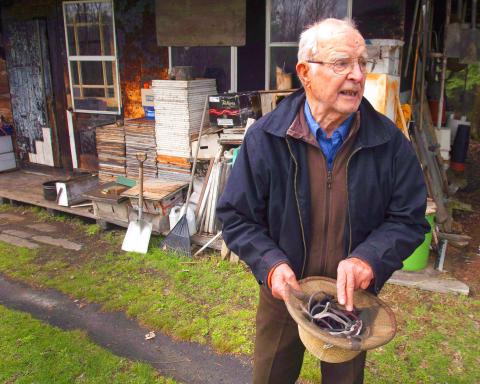Vladimir Katriuk, a Ukrainian-born beekeeper who was No. 2 on the Simon Wiesenthal Center’s list of most wanted Nazi war criminals, died this month in a hospital in Salaberry-de-Valleyfield, Quebec, near where he lived. He was 93.
The cause was a stroke, his lawyer, Orest Rudzik, said.
Katriuk died just two weeks after Moscow demanded his extradition, which the Canadian government, vexed by Russian aggression in Ukraine, frostily rebuffed.

Photo: AP
On Thursday last week, before Katriuk’s death became public, Canada’s Center for Israel and Jewish Affairs urged Ottawa to review the case and to “take the necessary steps to ensure that, if guilty, Katriuk be held accountable for war crimes committed in collaboration with the Nazi regime.”
Russia accused Katriuk of genocide in connection with the 1943 murder of civilians in Khatyn — not to be confused with the Katyn Forest in Russia, where in 1940 the Soviets massacred Polish officers — in what is now Belarus.
At the time, Katriuk was a sergeant in a Ukrainian battalion attached to Nazi storm troopers who rampaged eastward against Soviet partisans, overrunning villages like Khatyn. The troopers were accused of herding nearly 200 civilians into a barn in Khatyn, burning them alive and machine-gunning those who tried to flee.
Swedish academic Per Anders Rudling wrote in the journal Holocaust and Genocide Studies in 2012 that the troopers, whether motivated by ambition, anticommunism, nationalism or a desire “to save their own skin,” had “enabled or participated in some of the most gruesome episodes in modern European history.”
Efraim Zuroff, director of the Simon Wiesenthal Center, which was established to find and punish Nazi war criminals, said in an interview on Friday that the stumbling block to bringing Katriuk to justice was that “the most damning evidence against him was discovered relatively recently.”
“Of course, Katriuk’s death ends the case,” he said. “Because Russia asked for his extradition, finally there was a country that was willing to bring him to justice, but that did not happen because of contemporary politics.”

Four people jailed in the landmark Hong Kong national security trial of "47 democrats" accused of conspiracy to commit subversion were freed today after more than four years behind bars, the second group to be released in a month. Among those freed was long-time political and LGBTQ activist Jimmy Sham (岑子杰), who also led one of Hong Kong’s largest pro-democracy groups, the Civil Human Rights Front, which disbanded in 2021. "Let me spend some time with my family," Sham said after arriving at his home in the Kowloon district of Jordan. "I don’t know how to plan ahead because, to me, it feels

Polish presidential candidates offered different visions of Poland and its relations with Ukraine in a televised debate ahead of next week’s run-off, which remains on a knife-edge. During a head-to-head debate lasting two hours, centrist Warsaw Mayor Rafal Trzaskowski, from Polish Prime Minister Donald Tusk’s governing pro-European coalition, faced the Eurosceptic historian Karol Nawrocki, backed by the right-wing populist Law and Justice party (PiS). The two candidates, who qualified for the second round after coming in the top two places in the first vote on Sunday last week, clashed over Poland’s relations with Ukraine, EU policy and the track records of their

‘A THREAT’: Guyanese President Irfan Ali called on Venezuela to follow international court rulings over the region, whose border Guyana says was ratified back in 1899 Misael Zapara said he would vote in Venezuela’s first elections yesterday for the territory of Essequibo, despite living more than 100km away from the oil-rich Guyana-administered region. Both countries lay claim to Essequibo, which makes up two-thirds of Guyana’s territory and is home to 125,000 of its 800,000 citizens. Guyana has administered the region for decades. The centuries-old dispute has intensified since ExxonMobil discovered massive offshore oil deposits a decade ago, giving Guyana the largest crude oil reserves per capita in the world. Venezuela would elect a governor, eight National Assembly deputies and regional councilors in a newly created constituency for the 160,000

North Korea has detained another official over last week’s failed launch of a warship, which damaged the naval destroyer, state media reported yesterday. Pyongyang announced “a serious accident” at Wednesday last week’s launch ceremony, which crushed sections of the bottom of the new destroyer. North Korean leader Kim Jong-un called the mishap a “criminal act caused by absolute carelessness.” Ri Hyong-son, vice department director of the Munitions Industry Department of the Party Central Committee, was summoned and detained on Sunday, the Korean Central News Agency (KCNA) reported. He was “greatly responsible for the occurrence of the serious accident,” it said. Ri is the fourth person